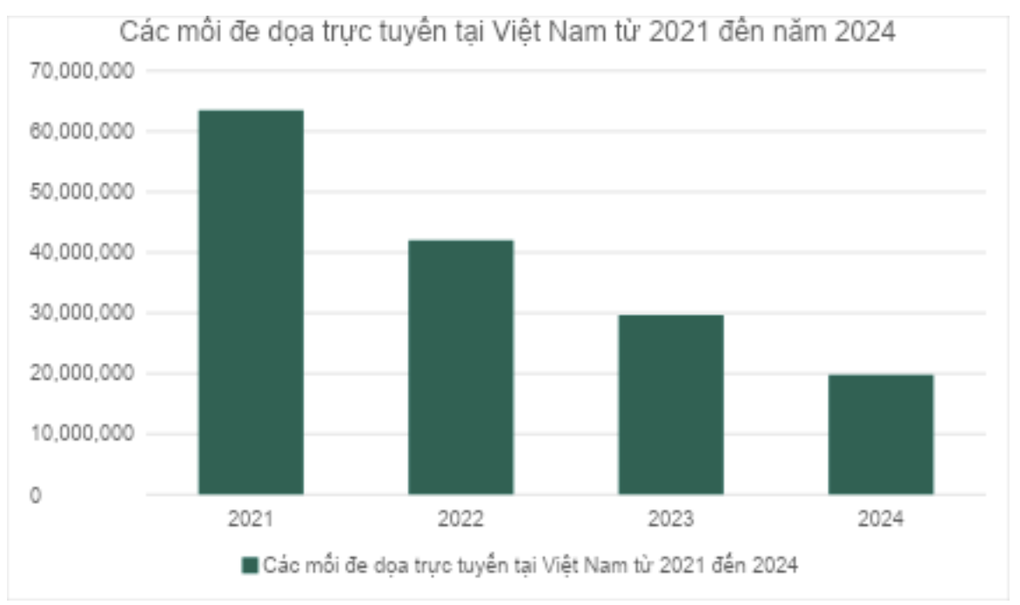According to the latest data from Kaspersky Security Network’s report, in 2024, Kaspersky blocked 19,816,401 cyber threats in Vietnam. This number shows a significant decrease compared to the total number of cyber threats in 2023, which was 29,625,939 cases.
Cyber threats are attacks that exploit vulnerabilities in web browsers, plugins, and online platforms to distribute malicious software containing harmful content to deceive users.
 Graph showing a decline in cybersecurity threats in Vietnam from 2021 to 2024The number of cybersecurity threats in Vietnam has gradually decreased from 2021 to 2024 (Photo: Kaspersky).
Graph showing a decline in cybersecurity threats in Vietnam from 2021 to 2024The number of cybersecurity threats in Vietnam has gradually decreased from 2021 to 2024 (Photo: Kaspersky).
Cybercriminals typically use two methods to access users’ systems: drive-by downloads and social engineering attacks.
In drive-by download attacks, hackers embed malicious code into a website. When victims visit the infected site, their computers automatically download the malware without user consent.
Additionally, with the more sophisticated social engineering technique, hackers disguise malware as legitimate programs and attempt to persuade victims to download them onto their computers.
These malicious programs are often distributed through phishing emails, fake websites, misleading ads…
Based on the statistics above, Vietnam has seen a significant reduction in cyberattacks over the past four years.
“After years of relentless effort, Vietnam has made remarkable progress and is steadily achieving the cybersecurity goals set by the government for 2025, which involve monitoring and ensuring information security in cyberspace,” said Mr. Yeo Siang Tiong, General Director of Kaspersky Southeast Asia.
However, Vietnamese users still face ongoing issues with online scams and phishing attacks. According to the National Cybersecurity Association, it’s estimated that in 2024, Vietnamese people lost 18.9 trillion VND due to online fraud.
“In Vietnam, one of the most common cyberattack methods used by hackers is social engineering.
Using personal information shared by users on social media, cybercriminals create various scam scenarios designed to trick victims into believing they will receive attractive benefits from websites embedded with malicious code.
More dangerously, the support of artificial intelligence (AI) has enabled cybercriminals to fully exploit leaked information to diversify their scam tactics,” Mr. Yeo explained.
Mr. Yeo assessed that Vietnam has made significant progress in addressing cybersecurity challenges and has the potential to achieve great success in the future by adopting advanced cybersecurity solutions and effective anti-phishing strategies.
Expert Advice
Experts offer several recommendations to help individuals and organizations protect themselves against online threats.
Users should avoid downloading and installing applications from untrustworthy sources; regularly update software with the latest patches to ensure maximum device safety.
Always be cautious about requests for personal information from strangers and limit sharing personal details in any form.
Be careful when clicking on links from unknown sources or suspicious online advertisements.
Create strong and unique passwords using a combination of lowercase and uppercase letters, numbers, punctuation, and special characters; enhance security by enabling two-factor authentication.
Organizations must use strong passwords to access enterprise systems and implement multi-factor authentication for remote employee access.
IT teams at businesses should regularly check and install updates to fix security vulnerabilities.
Organizations and businesses should strengthen cybersecurity training for employees to prevent attacks via social engineering techniques.
Both individual users and businesses should install reputable and robust security software on their computers to protect systems from malware and online attacks.



